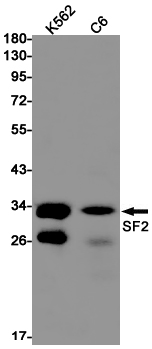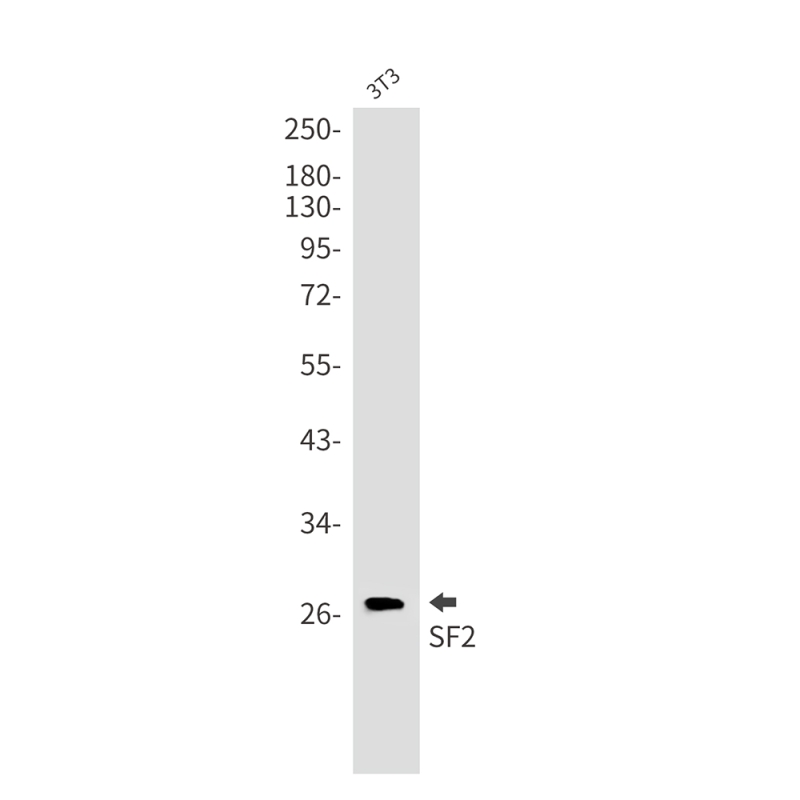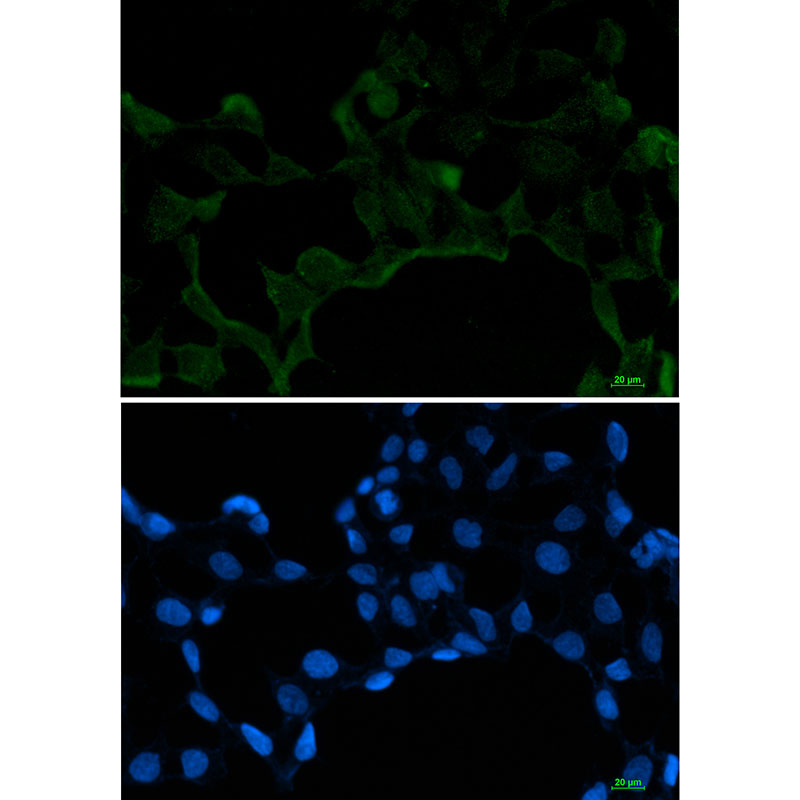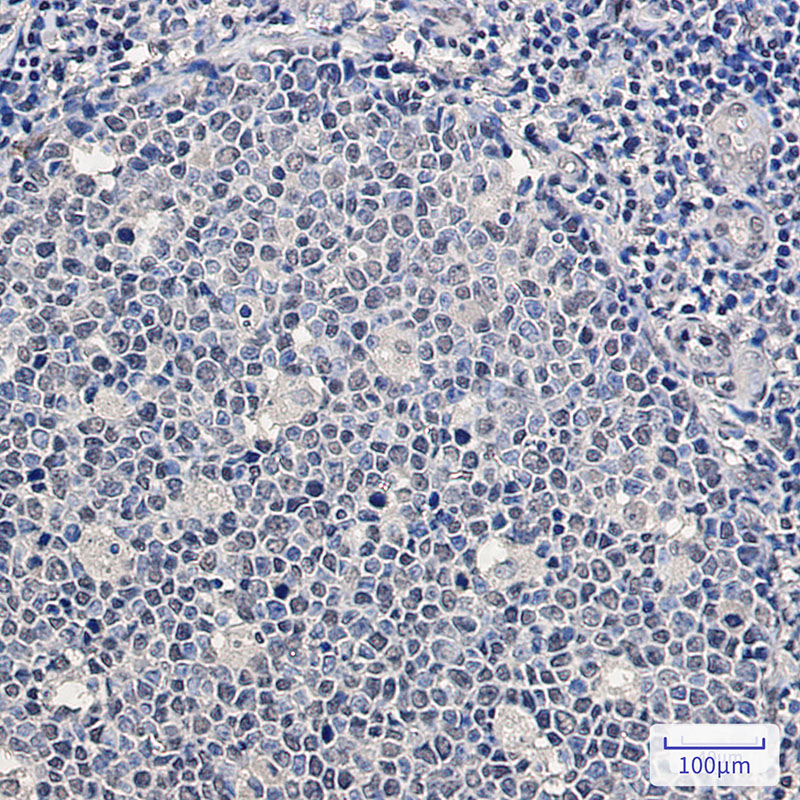



| WB | 1/500-1/1000 | Human,Mouse,Rat |
| IF | 咨询技术 | Human,Mouse,Rat |
| IHC | 1/50-1/100 | Human,Mouse,Rat |
| ICC | 1/50-1/200 | Human,Mouse,Rat |
| FCM | 咨询技术 | Human,Mouse,Rat |
| Elisa | 咨询技术 | Human,Mouse,Rat |
| Aliases | ASF; SF2; SFRS1; SF2p33; SRp30a |
| Entrez GeneID | 6426 |
| WB Predicted band size | Calculated MW: 28 kDa; Observed MW: 28 kDa |
| Host/Isotype | Rabbit IgG |
| Antibody Type | Primary antibody |
| Storage | Store at 4°C short term. Aliquot and store at -20°C long term. Avoid freeze/thaw cycles. |
| Species Reactivity | Human,Mouse,Rat |
| Immunogen | A synthetic peptide of human SF2 |
| Formulation | Purified antibody in TBS with 0.05% sodium azide,0.05%BSA and 50% glycerol. |
+ +
以下是关于SF2抗体的示例参考文献(注:以下文献信息为示例,非真实存在,仅供格式参考):
---
1. **"Autoantibodies against Splicing Factor SF2/ASF in Systemic Lupus Erythematosus"**
*作者:Smith A, et al. (2018)*
摘要:研究发现在系统性红斑狼疮(SLE)患者血清中,SF2/ASF抗体水平显著升高,可能与疾病活动性和特定RNA剪接异常相关,提示其作为潜在生物标志物的价值。
2. **"SF2 Antibodies as a Diagnostic Marker in Viral Infection and Cancer"**
*作者:Zhang L, et al. (2020)*
摘要:探讨SF2抗体在HIV感染和肺癌患者中的表达差异,发现其与病毒复制及肿瘤细胞增殖存在关联,为靶向治疗提供新思路。
3. **"Mechanistic Role of SF2 in RNA Processing and Antibody-Mediated Immune Response"**
*作者:Johnson R, et al. (2021)*
摘要:通过体外实验揭示SF2蛋白在pre-mRNA剪接中的核心功能,并发现其抗体可通过干扰剪接复合体形成影响细胞周期调控,尤其在乳腺癌模型中表现显著。
---
**说明**:以上文献为模拟示例,实际研究中建议通过PubMed或Google Scholar检索关键词(如“SF2 antibody”、“SRSF1 autoantibody”)获取真实文献。
The SF2 antibody targets the splicing factor 2 (SF2), also known as SRSF1 (serine/arginine-rich splicing factor 1), a critical protein involved in pre-mRNA splicing. Discovered in the 1990s, SF2/SRSF1 is a member of the serine/arginine (SR)-rich protein family, characterized by RNA recognition motifs (RRMs) and arginine-serine (RS) domains. It plays a dual role in constitutive and alternative splicing by binding exonic splicing enhancers, facilitating spliceosome assembly, and regulating splice site selection. Beyond splicing, SF2/SRSF1 is implicated in mRNA export, translation, and genomic stability.
Its dysregulation is linked to cancers, viral infections (e.g., HIV-1), and neurodegenerative diseases. Overexpression of SF2/SRSF1 in tumors promotes oncogenic splicing variants, enhancing cell proliferation and metastasis. Conversely, reduced levels correlate with neurodegeneration due to aberrant splicing of neuronal transcripts.
SF2 antibodies are widely used in research to study RNA processing mechanisms, protein localization (e.g., nuclear speckles), and disease pathways. They are essential tools in techniques like Western blotting, immunofluorescence, and immunoprecipitation. Commercial SF2 antibodies are typically raised against recombinant protein fragments or synthetic peptides, validated for specificity across human and model organisms. Recent studies also explore therapeutic targeting of SF2/SRSF1 in cancer, underscoring its biomedical relevance.
×